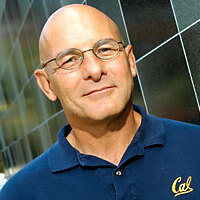
Andrew Stuart Tanenbaum, sometimes referred to by the handle ast, is an American–Dutch computer scientist and professor emeritus of computer science at the Vrije Universiteit Amsterdam in the Netherlands.

David Andrew Patterson is an American computer pioneer and academic who has held the position of professor of computer science at the University of California, Berkeley since 1976. He announced retirement in 2016 after serving nearly forty years, becoming a distinguished software engineer at Google. He currently is vice chair of the board of directors of the RISC-V Foundation, and the Pardee Professor of Computer Science, Emeritus at UC Berkeley.

Barbara Liskov is an American computer scientist who has made pioneering contributions to programming languages and distributed computing. Her notable work includes the introduction of abstract data types and the accompanying principle of data abstraction, along with the Liskov substitution principle, which applies these ideas to object-oriented programming, subtyping, and inheritance. Her work was recognized with the 2008 Turing Award, the highest distinction in computer science.
Scott J. Shenker is an American computer scientist, and professor of computer science at the University of California, Berkeley. He is also the leader of the Extensible Internet Group at the International Computer Science Institute in Berkeley, California.
Dr. Alan Jay Smith is a computer scientist and researcher in the field of development and applications of caching strategies and the measurement and analysis of computer storage systems with many important contributions to the field. He currently is professor emeritus at the EECS faculty of the University of California, Berkeley.

Joseph M. Hellerstein is an American professor of computer science at the University of California, Berkeley, where he works on database systems and computer networks. He co-founded Trifacta with Jeffrey Heer and Sean Kandel in 2012, which stemmed from their research project, Wrangler.
The IEEE Annual Symposium on Foundations of Computer Science (FOCS) is an academic conference in the field of theoretical computer science. FOCS is sponsored by the IEEE Computer Society.
Hari Balakrishnan is the Fujitsu Professor of Computer Science and Artificial Intelligence in the Department of Electrical Engineering and Computer Science at MIT, and the Co-founder and CTO at Cambridge Mobile Telematics.

Richard Ryan Williams, known as Ryan Williams, is an American theoretical computer scientist working in computational complexity theory and algorithms.

Jitendra Malik is an Indian-American academic who is the Arthur J. Chick Professor of Electrical Engineering and Computer Sciences at the University of California, Berkeley. He is known for his research in computer vision.

Elie Bursztein, born 1 June 1980 in France, is a French computer scientist and software engineer. He is currently Google and DeepMind AI cybersecurity technical and research lead.

Ion Stoica is a Romanian–American computer scientist specializing in distributed systems, cloud computing and computer networking. He is a professor of computer science at the University of California, Berkeley and co-director of AMPLab. He co-founded Conviva and Databricks with other original developers of Apache Spark.
Alice Jane Brush is an American computer scientist known for her research in human-computer interaction, ubiquitous computing and computer supported collaborative work (CSCW). She is particularly known for her research studying and building technology for homes as well as expertise conducting field studies of technology. She is the co-chair of CRA-W from 2014 to 2017.
RIPE Atlas is a global, open, distributed Internet measurement platform, consisting of thousands of measurement devices that measure Internet connectivity in real time.
Venkata Narayana Padmanabhan is a computer scientist and principal researcher at Microsoft Research India. He is known for his research in networked and mobile systems. He is an elected fellow of the Indian National Academy of Engineering, Institute of Electrical and Electronics Engineers and the Association for Computing Machinery. The Council of Scientific and Industrial Research, the apex agency of the Government of India for scientific research, awarded him the Shanti Swarup Bhatnagar Prize for Science and Technology, one of the highest Indian science awards for his contributions to Engineering Sciences in 2016.

Richard Vuduc is a tenured professor of computer science at the Georgia Institute of Technology. His research lab, The HPC Garage, studies high-performance computing, scientific computing, parallel algorithms, modeling, and engineering. He is a member of the Association for Computing Machinery (ACM). As of 2022, Vuduc serves as Vice President of the SIAM Activity Group on Supercomputing. He has co-authored over 200 articles in peer-reviewed journals and conferences.

Eugene Wong is a Chinese-American computer scientist and mathematician. Wong's career has spanned academia, university administration, government and the private sector. Together with Michael Stonebraker and a group of scientists at IBM, Wong is credited with pioneering database research in the 1970s from which software developed by IBM, Microsoft, and Oracle descends. Wong retired in 1994, since then holding the title of Professor Emeritus of Electrical Engineering and Computer Sciences at University of California, Berkeley.
Dawson R. Engler is an American computer scientist and an associate professor of computer science and electrical engineering at Stanford University.

Kevin Fu is a professor of computer science in the Khoury College of Computer Sciences at Northeastern University known for his contributions to computer security and security for medical devices. Previously, he was a professor at the University of Michigan.










